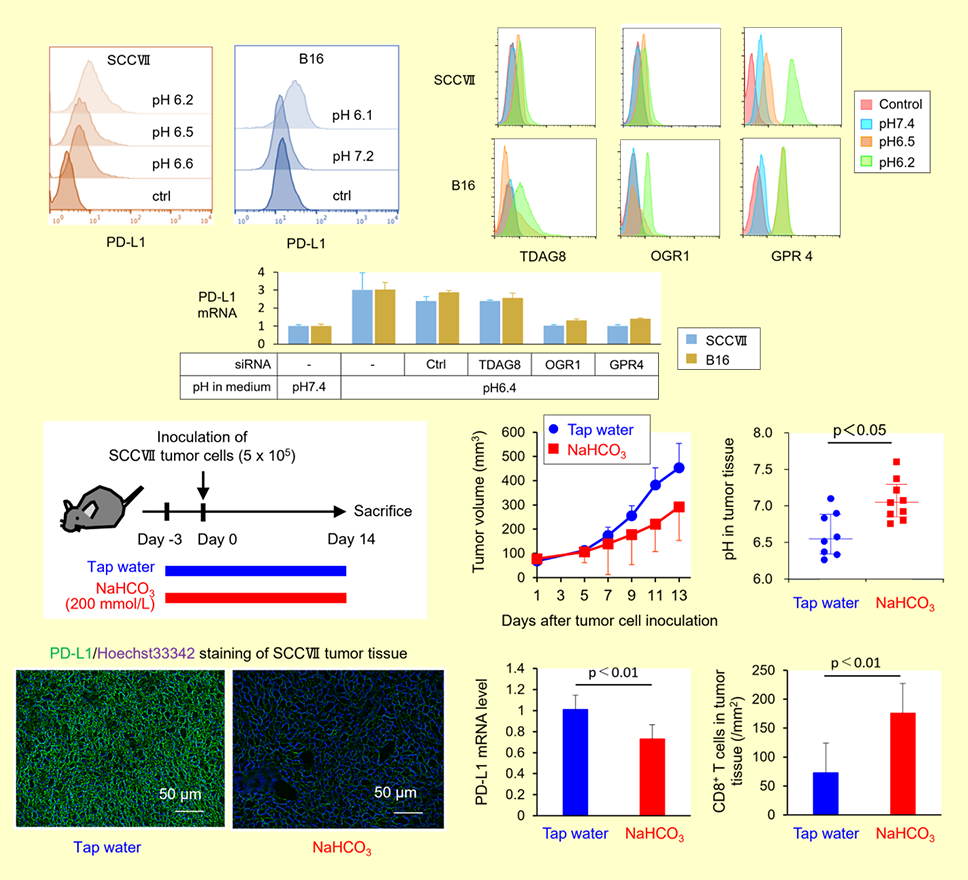プロジェクトのご紹介 2 - Project 2 -
腫瘍微小環境の低pHはプロトンセンサーGたんぱく共役レセプターをを介して腫瘍のPDL-1の発現を低下させる
Extracellular acidity in tumor tissue upregulates programmed cell death protein 1 expression on tumor cells via proton-sensing G protein-coupled receptors

Acidity in the tumor microenvironment has been reported to promote cancer growth and metastasis. In this study, we examined a potential relation between extracellular acidity and expression level of the immune checkpoint molecule PD-L1 in murine squamous cell carcinoma (SCC) and melanoma cell lines. PD-L1 expression in the tumor cells was upregulated by culturing in a low pH culture medium. Tumor-bearing mice were allowed to ingest sodium bicarbonate, resulting in neutralization of acidity in the tumor tissue, a decrease in PD-L1 expression in tumor cells, and suppression of tumor growth in vivo. Proton-sensing G protein-coupled receptors (GPCRs), T cell death-associated gene 8 (TDAG8) and ovarian cancer G-protein-coupled receptor 1 (OGR1), were upregulated by low pH, and essentially involved in the acidity-induced elevation of PD-L1 expression in the tumor cells. Human head and neck SCC RNAseq data from the Cancer Genome Atlas also suggested a statistically significant correlation between expression levels of the proton sensors and PD-L1 mRNA expression. These findings strongly suggest that neutralization of acidity in tumor tissue may result in reduction of PD-L1 expression, potentially leading to inhibition of an immune check point and augmentation of anti-tumor immunity.
悪性腫瘍の細胞外微小環境は通常弱酸性であり、これが腫瘍細胞の増殖や転移に関わると考えられている。細胞外の弱酸性環境がPD-L1発現に及ぼす影響について、頭頚部扁平上皮癌とメラノーマ細胞株を用いて調べた。弱酸性環境下で培養するとPD-L1発現が可逆的に上昇した。低pH環境で培養した腫瘍細胞は、プロトンセンサーGたんぱく共役レセプター(GPCR)のTDAG8、OGR1とGPR4の発現が亢進しており、 OGR1とGPR4をノックダウンすると弱酸性環境によるPD-L1発現が有意に抑制された。頭頚部扁平上皮癌細胞を移植したマウスに炭酸水素ナトリウム水を経口投与すると、腫瘍の増大が抑制され、腫瘍内のpHの上昇、PD-L1発現の低下とCD8+T細胞の増加を認めた。細胞外のpH変化とPD-L1発現には細胞膜上のpH感知性チャネルが関わる。The Cancer Genome Atlas(TCGA)ではTDAG8とOGR1の発現量がPD-L1発現量と有意に相関することがわかった。従って、癌細胞は癌微小環境の弱酸性をプロトンセンサーGPCRにて感知し、これらの発現を増強するとともにPD-L1発現を亢進させてCD8+T細胞による攻撃をエスケープしており、癌微小環境を中和できれば免疫チェックポイント阻害薬治療の効果が向上する可能性があると考える。
一部プロジェクトのご紹介 - See some projects among others -
- 新型コロナウイルス・オミクロン変異株に対する茶カテキン類の効果
Effects of tea catechin-related compounds on Omicron subvariants of SARS-CoV-2 - 腫瘍微小環境の低pHはプロトンセンサーGたんぱく共役レセプターをを介して腫瘍のPDL-1の発現を低下させる
Extracellular acidity in tumor tissue upregulates programmed cell death protein 1 expression on tumor cells via proton-sensing G protein-coupled receptors - 緑茶カテキン、カテキン誘導体、およびガレート型テアフラビンによる新型コロナウイルスの試験管内での有意な不活化;紅茶と緑茶による試験管内での唾液中の新型コロナウイルスの迅速な不活化
Significant Inactivation of SARS-CoV-2 by a Green Tea Catechin, a Catechin-derivative and Galloylated Theaflavins in vitro; Rapid Inactivation in vitro of SARS-CoV-2 in Saliva by Black Tea and Green Tea - 新規多孔性3Dスキャフォールドと直接誘導骨芽細胞を用いた骨再生
Nanogel tectonic porous 3D scaffold for direct reprogramming fibroblasts into osteoblasts and bone regeneration - TGFR阻害剤による骨芽細胞のケミカル・ダイレクト・リプログラミング
Chemical direct reprogramming of human fibroblasts into osteoblasts by a TGFR blockade - 筋芽細胞のダイレクト・リプログラミングと筋管形成
Direct reprogramming of functional myoblasts that are capable of forming multinuclear myotube - シュワン細胞のダイレクト・リプログラミングと末梢神経損傷の再生
Direct reprogramming of functional Schwann cells that promote regeneration of peripheral nerve - 褐色脂肪のダイレクト・リプログラミングと代謝疾患の制御
Direct reprogramming of functional brown adipocytes that control metabolic diseases - 骨芽細胞のダイレクト・リプログラミングと骨再生
Direct reprogramming of functional osteoblasts that regenerate bone tissue - IL-21 によるアレルギー応答の制御とその分子機構
IL-21-mediated regulation of allergic responses and its molecular mechanisms - IL-27 による NK 細胞活性化と ADCC を介した腫瘍抑制
IL-27 augments NK cytotoxicity and induces ADCC-based tumor suppression - EBV- エピゾーマルベクターによる外来遺伝子の高効率導入、高発現、長期間持続の機構解明
Mechanisms underlying the high-rate transfection, high-level expression, and long-term maintenance of exogenous genes mediated by the Epstein-Barr virus-based episomal vector - 細胞の分化と初期化に伴う染色体エピジェネティック修飾の解析
Analyses of epigenetic modification of chromosomes upon cell differentiation and reprogramming

